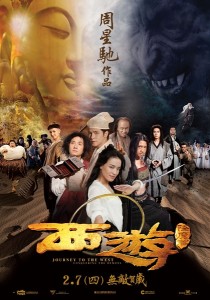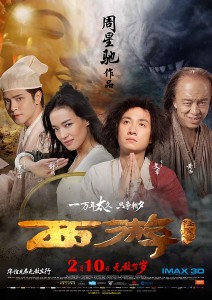Journey to the West: Conquering the Demons
西游 降魔篇
China/Hong Kong, 2013, colour, 2.35:1, 3-D, 109 mins.
Director: Zhou Xingchi 周星驰 [Stephen Chow].
Associate director: Guo Zijian 郭子健 [Derek Kwok].
Rating: 8/10.
After the lame CJ7, Zhou Xingchi [Stephen Chow] finally bounces back as a comic writer-director.
Ancient China. Young Buddhist monk Xuanzang (Wen Zhang) arrives in a fishing village where a man has been eaten by something in the water. A fake Daoist priest (Feng Mianheng) kills a giant stingray and declares the water is now safe; Xuanzang disagrees and is strung up by the villagers. However, when a giant Fish Demon appears and eats first the dead man’s young daughter, Gen Changsheng (Zhang Yuwen), and then her mother, Xuanzang helps the villagers to conquer it. After the fish morphs into a young man (Li Shangzheng), Xuanzang’s powers prove insufficient to exorcise it; it is demon hunter Miss Duan (Shu Qi) who finally eradicates the evil spirit. Depressed, Xuanzang tells his master (Cheng Sihan) that his book of song mantras, 300 Nursery Rhymes 儿歌三百首, is useless; the master says the fault is not the book, which is designed to bring out the goodness in beings, but Xuanzang’s still-incomplete faith. Some time later, at Gao Family Inn, famous  for its delicious roast pork, Xuanzang finds himself facing hordes of demons; he’s again saved by Miss Duan, who uses her magical Infinite Flying Ring. However, the cook, Master of Meat, who is actually Pig Demon Zhu Ganglie (Chen Bingqiang), escapes. Miss Duan asks Xuanzang to kiss her in thanks, but he runs off, scared. In order to gain true “buddhahood”, Xuanzang sets out to find Sun Wukong, aka Monkey King, on Five Fingers Mountain. En route, he again bumps into Miss Duan, who is with a group of goblins; she tells Xuanzang she’s chosen him to be her husband, which again terrifies him. More demon-hunters, including Monk Sandy (Li Shangzheng), Almighty Foot (Zhang Chaoli) and the epicene Prince Vacant (Luo Zhixiang), arrive and help to ward off another attack by Zhu Ganglie. After the group fails to agree on joining forces to defeat Zhu Ganglie once and for all, Xuanzang continues alone on his journey to Five Fingers Mountain. There, Sun Wukong (Huang Bo) turns out to be very different from what Xuanzang expected.
for its delicious roast pork, Xuanzang finds himself facing hordes of demons; he’s again saved by Miss Duan, who uses her magical Infinite Flying Ring. However, the cook, Master of Meat, who is actually Pig Demon Zhu Ganglie (Chen Bingqiang), escapes. Miss Duan asks Xuanzang to kiss her in thanks, but he runs off, scared. In order to gain true “buddhahood”, Xuanzang sets out to find Sun Wukong, aka Monkey King, on Five Fingers Mountain. En route, he again bumps into Miss Duan, who is with a group of goblins; she tells Xuanzang she’s chosen him to be her husband, which again terrifies him. More demon-hunters, including Monk Sandy (Li Shangzheng), Almighty Foot (Zhang Chaoli) and the epicene Prince Vacant (Luo Zhixiang), arrive and help to ward off another attack by Zhu Ganglie. After the group fails to agree on joining forces to defeat Zhu Ganglie once and for all, Xuanzang continues alone on his journey to Five Fingers Mountain. There, Sun Wukong (Huang Bo) turns out to be very different from what Xuanzang expected.
REVIEW
Five years after the vacuous, over-cute CJ7 长江7号 (2008), Hong Kong’s Zhou Xingchi 周星驰 [Stephen Chow] returns revitalised with his eighth film as a writer-director, Journey to the West: Conquering the Demons 西游 降魔篇. The first in which Zhou doesn’t also appear as an actor, it nonetheless has a 100% feel of one of his productions – from the inventive way in which gags are developed, through the sympathetic handling of actors, to its ingenuously optimistic view of humanity. In fact, the absence of Zhou on screen even benefits the movie’s creativity, by throwing the spotlight full on his cast and not being able to fall back on his well-patented mannerisms.
Though it only becomes crystal clear at the end, the film is essentially a prequel to A Chinese Odyssey Part One: Pandora’s Box 西游记 第壹佰零壹回之月光宝盒 (1995) and A Chinese Odyssey Part Two: Cinderella 西游记 大结局之仙履奇缘 (1995), in which Zhou starred as Monkey King under the manic direction of Liu Zhenwei 刘镇伟 [Jeff Lau]. In tone, however, it’s very different – much less full of Chinese Buddhist mythological references, characterised more on a human level (and therefore more accessible to a wider audience) and not at all repetitious. Though visual effects are used throughout, they don’t dominate the film in the same way as in Odyssey, functioning more as decoration to the action and comedy rather than becoming the movie’s sine qua non. Only in the last 20 minutes does the CGI really take over, supplying a suitably spectacular finale prior to the simple ending. Throughout, 3-D is used in the same way.
Journey also marks a return by Zhou to his simple, humanistic approach towards comedy, which was a feature of his 1990s films but became progressively lost in more ambitious later works like the 2004 Kung Fu Hustle 功夫 (with all its retro references) and CJ7 (with its soppy emotionalism). The opening 20 minutes, set in a village terrorised by a giant Fish Demon, is a wonderfully contained setpiece which rapidly sketches memorable characters and then organically develops action sequences in a classic Hong Kong way, exploiting existing props and sets. After the character of the naive young monk Xuanzang (aka Tripitaka) has been established, and his co-lead, demon hunter Miss Duan, is also introduced in brief but striking fashion, the movie is ready to set out on its journey – to conquer the evil Pig Demon with a little help from the sly Monkey King on the way.
The space that Zhou finds for his actors inbetween the visual effects is eagerly taken up by the cast, not least by top-billed Taiwan actress Shu Qi 舒淇, simply terrific here as a fearless demon hunter who can beat up bad spirits with the best of them. As Xuanzang, China’s Wen Zhang 文章 (Ocean Heaven 海洋天堂, 2010; Love Is Not Blind 失恋33天, 2011) can’t help but be overshadowed in a role that’s largely vanilla by comparison, though he makes the most of scenes in which Shu’s demon hunter panics him with her sexual aggressiveness. Until the appearance, an hour or so in, of goofy Mainland comedian Huang Bo 黄渤 as a very human-looking Monkey King, Shu doesn’t have much competition; Huang takes over for a while, in a beautifully observed, crafty performance, before Shu also turns up again for the finale. Zhou’s confidence in his actors is visible in him just letting the camera run in several dialogue scenes, without any cut-aways or other editing.
Elsewhere, there are some lovely comic ideas, such as a self-important, epicene prince (played by Taiwan singer-dancer Luo Zhixiang 罗志祥) and his retinue of not-so-young “babes”; a band of goblins, including one whose neck won’t stop spurting blood and a spunky young woman (barely recognisable as Hong Kong pseudo-model Zhou Xiuna 周秀娜); plus the fake Daoist priest played by Feng Mianheng 冯勉恒 in the opening sequence. Throughout, the Greater China cast (dominated by Mainlanders) melds smoothly and though the script (credited to eight writers) is blocky in terms of construction – basically with four distinct acts – the on-screen chemistry between the actors carries it smoothly at an emotional level. Music, in the form of both songs and soundtrack scoring, is prominent throughout, with the light soundtrack of Huang Yinghua 黄英华 [Raymond Wong Ying-wah], partly jaunty, partly recalling a sub-Morricone Italian sound of the 1970s, a big help in sustaining mood.
Like Zhou’s first four films as writer-director, Journey also has an “associate director”, in this case Guo Zijian 郭子健 [Derek Kwok], best known for co-directing retro martial-arts comedy Gallants 打擂台 (2010) with Zheng Sijie 郑思杰 [Clement Cheng]. Guo’s contribution is invisible on any stylistic level.
CREDITS
Presented by Huayi Brothers Media (CN), Bingo Group (CN), ChinaVision Media Group (CN), China Film (CN), Village Roadshow Pictures Asia (CN), Edko Films (HK). Produced by Gang Jing (CN), Huayi Brothers Media (CN).
Script: Zhou Xingchi [Stephen Chow], Guo Zijian [Derek Kwok], Huo Xin, Wang Yun, Feng Zhiqiang, Lu Zhengyu, Li Shangzheng, Jiang Yuyi [Ivy Kong]. Photography: Cai Chonghui [Johnny Choi]. Editing: Chen Zhiwei [Andy Chan]. Music: Huang Yinghua [Raymond Wong Ying-wah]. Production design: Yu Jia’an [Bruce Yu]. Art direction: Lin Ziqiao. Costume design: Li Bijun [Lee Pik-kwan]. Sound: Zhu Yanfeng, Liang Zhonghou. Action: Gu Xuanzhao. Visual effects: Luo Weihao (Macrograph, Different Digital Design). 3-D: Venture 3D. Post-production supervisor: Lin An’er [Angie Lam].
Cast: Shu Qi (Miss Duan), Wen Zhang (Xuanzang/Tripitaka), Huang Bo (human Monkey King), Luo Zhixiang (Prince Vacant/Prince Important/Prince Impotent), Li Shangzheng (Sandy, monk), Chen Bingqiang (Zhu Ganglie/Pig Demon/K.L. Hog), Cheng Sihan (Chen Xuanzang’s nameless master), Shi Xingyu (Big Dipper Five-Form Fist), Lu Zhengyu (Chief Goblin), Zhao Zhiling (Second Goblin), Yang Di (Third Goblin/Blood-Spurter), Zhou Xiuna (Fourth Goblin/Little Sister), Ge Xingyu (Fifth Goblin; real Monkey King), Feng Mianheng (fake Daoist priest), Yang Neng (fishing village head), Zhang Chaoli (Almighty Foot), He Wenhui (Feng, inn customer), Tang Yixin (Yunlei, his companion), Chen Yichun (Gao Family Inn female fighter), Liu Zhanling (Gao Family Inn male fighter), Huang Xiaochuan (sandman), Zhang Yuwen (Gen Changsheng, young girl), Xu Min (Mrs. Gen, Gen Changsheng’s mother), Li Jing (Gen Changgen, Gen Changsheng’s father), Zhang Weifu (Gen, fisherman), Fan Fulin (Da Li), Dai Qihua (Lan), Zhong Kaijie (Lan’s baby), Xie Jingjing (fat villager), Yu Qianwen (fat villager’s husband), Kong Wushuang (girl singing mountain song), Li Gaoji, Wen Feifei, Huang Haisen (Daoists), Wang Li, Jin Jinnv, Zhang Mei’e, Xu Caixiang (Prince’s four “beauties”).
Release: Hong Kong, 7 Feb 2013; China, 10 Feb 2013.
(Review originally published on Film Business Asia, 7 Mar 2013.)
